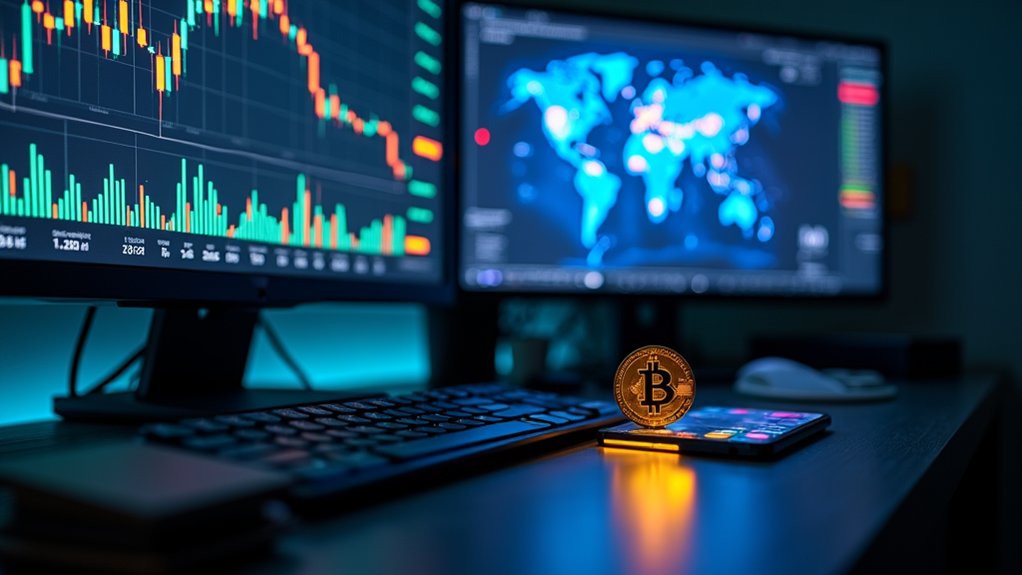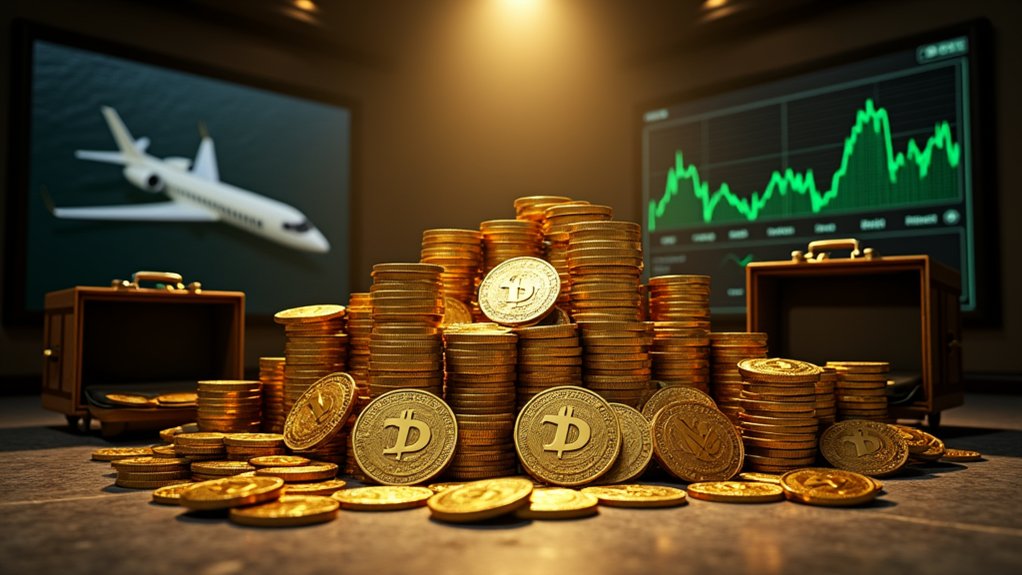Investing in crypto gaming involves establishing a non-custodial wallet, acquiring gaming tokens like Enjin or Axie Infinity, and purchasing NFTs representing virtual land or equipment. Investors should evaluate projects based on market capitalization, trading volume, and development activity while implementing robust security measures, including hardware wallets. A diversified approach across gaming subsectors mitigates risk, with attention to both established and emerging projects. The combination of passive income through staking and true ownership of digital assets offers compelling long-term growth potential.

Since blockchain technology continues to revolutionize various industries, the intersection of cryptocurrency and gaming presents a particularly lucrative frontier for investors seeking diversification in the digital asset space. The emergent GameFi sector offers multiple entry points, including direct investment in gaming tokens like Enjin Coin or Axie Infinity Token, which function as in-game currencies and potential appreciating assets.
Investors may also consider acquiring NFTs representing virtual land, characters, or equipment that can be traded on secondary markets, potentially yielding substantial returns as game popularity increases. Many players appreciate that these NFTs provide true ownership of in-game assets unlike traditional gaming models where companies retain all property rights.
For those interested in passive income strategies, staking gaming tokens and participating in yield farming represent viable alternatives to direct asset speculation. By locking tokens into gaming protocols or providing liquidity to decentralized exchanges, investors can earn regular rewards while maintaining exposure to the broader crypto gaming market. Some platforms may implement security measures similar to those used by Cloudflare to protect against malicious activities and ensure transaction safety.
Platform tokens like The Sandbox's SAND offer additional investment vectors, as they represent ownership stakes in extensive gaming ecosystems rather than individual titles.
Initiating investment in this sector requires establishing secure infrastructure, beginning with setting up a non-custodial wallet such as MetaMask to maintain control over digital assets. Players can earn digital assets by completing tasks within games that utilize blockchain technology. Investors should subsequently establish accounts on reputable exchanges that support gaming tokens, while implementing robust security measures including hardware wallets for significant holdings.
Market analysis tools like CoinGecko provide essential metrics for evaluating potential investments, including trading volume, market capitalization, and development activity.
Prudent diversification across gaming subsectors, blockchain infrastructures, and market capitalizations helps mitigate risk in this volatile market. Evaluating fundamentals such as tokenomics, revenue models, and governance structures remains vital for identifying sustainable investments rather than short-lived speculative opportunities.
The most sophisticated investors also monitor regulatory developments affecting play-to-earn models and maintain sufficient liquidity through stablecoins to capitalize on market dislocations.
As the sector matures, particular attention should be directed toward emerging trends including metaverse assimilation, cross-chain asset interoperability, and the entrance of established gaming studios into blockchain-based development, all of which signal potential long-term growth trajectories.
Frequently Asked Questions
What Are the Tax Implications of Crypto Gaming Investments?
The tax consequences of crypto gaming investments include multiple taxable events, including capital gains from trading in-game currencies and NFTs, ordinary income from earning rewards or airdrops, and potential self-employment tax for mining activities.
Investors must maintain detailed transaction records with fiat conversion values, since gaming assets are classified as property rather than currency under IRS rules, subjecting virtual land and collectible tokens to standard cryptocurrency taxation frameworks.
How Do Regional Regulations Affect Crypto Gaming Accessibility?
Regional regulations greatly impact crypto gaming accessibility, creating distinct operational landscapes across jurisdictions.
While the UK and Malta offer permissive frameworks with established licensing protocols, Asian markets like China and South Korea implement extensive bans on crypto gambling activities.
The United States presents a fragmented regulatory environment, with states like Wyoming explicitly allowing crypto in sports betting, while others, like Utah, prohibit all gambling activities regardless of currency type.
These jurisdictional variations necessitate careful compliance strategies for market participants.
Can I Stake Gaming Tokens for Passive Income?
Staking gaming tokens presents a viable passive income strategy, offering average yields of 6.08% APY, which greatly exceeds traditional savings instruments.
Investors can utilize various mechanisms, including decentralized exchanges and GameFi-specific platforms that require token immobilization for predetermined periods.
However, participants must carefully consider fundamental risks, particularly market volatility that directly impacts token values, while simultaneously balancing liquidity constraints against potential rewards when selecting appropriate staking protocols or delegation services.
What Are the Environmental Impacts of Crypto Gaming?
Crypto gaming's environmental impact stems primarily from blockchain infrastructure, with Proof-of-Work systems consuming substantial energy comparable to small nations' usage.
The sector contributes notably to carbon emissions, with single transactions potentially generating over 1,000 kg of CO₂, while rapid hardware obsolescence produces considerable e-waste containing toxic materials.
Although some platforms are shifting to more sustainable Proof-of-Stake models, which reduce energy consumption by over 99%, widespread environmental concerns persist amid inadequate recycling infrastructure and fossil fuel dependency.
How Can I Spot Potential Crypto Gaming Scams?
Identifying crypto gaming scams requires vigilant assessment of several red flags, including projects promising guaranteed returns, aggressive marketing tactics with artificial time constraints, and poor transparency regarding tokenomics or team credentials.
Investors should verify smart contract audits, examine liquidity levels, and scrutinize community engagement patterns.
Withdrawal restrictions, hidden fees, or requirements for additional investments to access profits indicate fraudulent operations, while unsolicited investment advice and celebrity endorsements without verification warrant substantial doubt.









